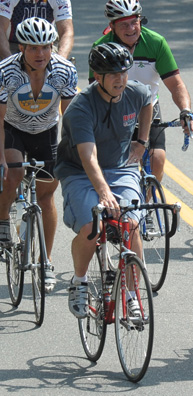Anxious about Congress messing up the federal transportation bill? There's a lot at stake in Washington, but consider this: 78 percent of transportation funds come from the state and local levels.
At a National Bike Summit panel yesterday on state-level bike advocacy campaigns, Dan Grunig of Bicycle Colorado spoke about the importance of reforming the agencies that spend the lion's share of America's transportation funding. “If you were starting from scratch and you said, ‘Where do I want to put my limited resources, where can I get the biggest bang for the buck?’, the federal piece of the pie is the smallest,” said Grunig, “and the states’ is the biggest.”
States even influence local spending, and they govern traffic laws. And who owns the roads? Grunig gave his own state as an example. Of 35,754 miles of roads in Colorado, 41 percent is city-owned, 26 percent is state-owned, and 33 percent is county-owned.
The federal transportation bill is extremely important, and national programs like Safe Routes to School have prompted state and local agencies to think about more than just moving cars and trucks. But advocates shouldn't let Congress dictate the pace of change. Sure, it would be huge if Washington raised the gas tax, Grunig said, but “the states aren’t waiting.” Between 2008 and 2010, 17 states enacted 29 new transportation funding bills.
A regressive transportation agency can stymie good federal programs at the state level, too. State DOTs don’t spend all the money that should be allocated for Safe Routes to School and other key bike/ped programs, for instance, choosing instead to rescind that money back to the federal government. Robert Ping of the Safe Routes to School National Partnership said SRTS was allocated $978 million for 2005-2011, but a lot of it “still needs to get out the door” or else it’s vulnerable to rescission.
“We’re saying this is an important investment into our state’s transportation network. We can't just keep building our roads and building our roads and not providing other alternatives.”
Delaware Secretary of Transportation Shailen Bhatt
Delaware Secretary of Transportation Shailen Bhatt oversaw the state’s first uses of Congestion Mitigation and Air Quality (CMAQ) money for bike/ped projects. He says his counterparts in other state DOTs aren’t so bad. “Lots of secretaries 'get it',” he said, pointing to Paula Hammond in Washington and DOT chiefs in Oregon, Tennessee, and Minnesota. But he added that a secretary that “gets it” can only do so much if she or he doesn’t work for a governor that “gets it.”
Bhatt says he doesn’t act alone. He half-jokingly offered a four-part recipe for advocacy success:
- Elect a governor who bikes.
- Elect senators who bike.
- Elect a congressmember who bikes.
- Get them all to show up at all of your events.
Easier said than done, right? Bhatt put the onus on advocates to close the deal by figuring out what message will speak to officials, some of whom haven’t seen a bicycle since their elementary school days. The desire to increase biking for biking’s sake might not resonate with them. Recreational cycling might not seem to be a cause worth spending scarce state dollars on. But they might listen to arguments about household budgets in times of high gas prices.
And state budgets are even closer to governors' hearts. Most states are suffering under tremendous burdens of cutbacks and debt. Bhatt said 36 percent of Delaware’s transportation operating budget goes to debt service.
And yet, his agency proposed $13 million for bike/ped improvements this year. “We’re not saying that this is a nice thing to have,” he said. “We’re saying this is important. This is an important investment that we’re making into our state’s transportation network. And we’re doing it in the face of all of these rising costs because we can't just keep building our roads and building our roads and not providing other alternatives.”
If you can show that there’s a solid return on investment, state DOT leaders will listen, he said.
Even if your state DOT isn’t your friend, your public health department is, said Dorian Grilley of the Bicycle Alliance of Minnesota. In his state, the Statewide Health Improvement Program has funded work on bike/walk master plans in 250 communities. “Public health people are your best friends,” he said. A tobacco lawsuit settlement a decade ago left Blue Cross Blue Shield flush with cash that they’ve pumped back into public health efforts, including cycling. They fund Minneapolis's Nice Ride bike-share program, among other projects.
And kids’ health is a great way to get your message across to politicians, said Ping. “There’s nothing better than mom and apple pie and cute kids to sell the bicycling message,” he said. And he said conservative legislators – including Newt Gingrich! – relate to bicycling as freedom, especially for kids. What could be more American than that?
One way or another, the message is getting out, and in Minnesota the people at the top are taking note. Minneapolis took home bicycle-friendly gold last year and was named Bicycling Magazine’s number one bicycling city. Meanwhile, the state of Minnesota has launched a bike-friendly state initiative, complete with a $500,000 advertising and marketing campaign. It’s a project of a variety of state agencies, including the tourism and health departments. Minnesota is also planning its first state-designated bikeway, an 800-mile stretch from the southeastern corner of the state to Bemidji, far up north. Even little Bemidji is in on the bike-friendly action, Grilley said. The town is pulling out parking spaces and putting in bike corrals.






